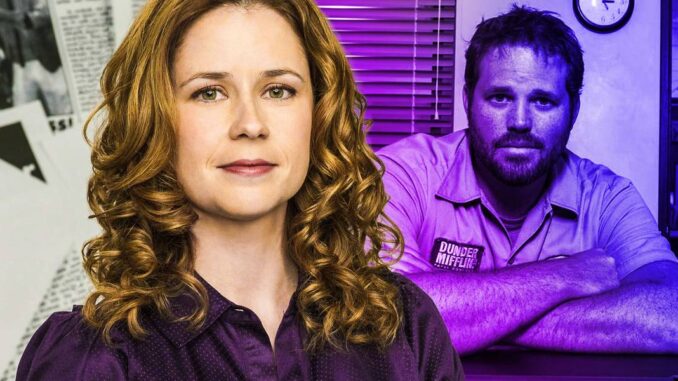
The air at any wedding crackles with a peculiar blend of hope, nervous anticipation, and the silent, fervent wish that everything will go perfectly. For the bride and groom, it’s the culmination of a dream; for the guests, a celebration. And for anyone involved in the logistics, it’s a tightrope walk over a chasm of potential mishaps. In the pantheon of televised nuptials, few moments are as indelibly etched into the collective memory for their sheer, agonizing cringe-worthiness as Phyllis Lapin-Vance’s wedding. And at the heart of the most spectacular faux pas was Pam Beesly, whose well-intentioned but fundamentally flawed decision laid the groundwork for a comedic and utterly mortifying disaster. Pam, often the sensible, grounded anchor in the chaotic Dunder Mifflin office, made a huge mistake at Phyllis’s wedding – a catastrophic miscalculation born of panic and a profound underestimation of the unique variables at play.
Pam’s journey to this regrettable moment began innocently enough. As the office administrator, she was naturally tasked with assisting with the wedding preparations, a role she approached with her characteristic blend of pragmatism and quiet desire to do good. She helped with decorations, coordinated details, and generally tried to inject a modicum of order into Michael Scott’s usual brand of chaotic enthusiasm. Her intentions were pure: she wanted Phyllis, a kind and often overlooked colleague, to have the perfect day she deserved. This desire, however, would prove to be her Achilles' heel when crisis inevitably struck.
The critical juncture arrived during the processional. Phyllis’s elderly father, already navigating the aisle in a wheelchair, encountered a sudden, inexplicable snag. The wheels ceased to turn, leaving the proud father of the bride stranded, mid-aisle, as the music played on and the anticipation curdled into an awkward silence. Panic, swift and insidious, seized Pam. Her mind, usually so adept at problem-solving, raced. Who could possibly assist? Who possessed the strength, the dedication, the sheer unyielding force of will to overcome this physical impediment? In a moment of high stress and poor judgment, Pam turned to the one person she believed was uniquely equipped for the task: Dwight Schrute, self-appointed Head of Wedding Security.
This was Pam’s monumental mistake. It wasn't just delegating; it was who she delegated to and her profound misjudgment of his capabilities and, more critically, his social filter. Pam, in her desperation, saw only Dwight’s physical prowess and his unwavering commitment to any perceived duty. She forgot, or perhaps simply overlooked in the heat of the moment, Dwight’s complete lack of tact, his literal interpretation of every instruction, and his notorious inability to read social cues. Her fatal error was believing that Dwight, given a vague directive to "fix" the wheelchair, would understand the inherent delicacy of the situation, the sacredness of the moment, and the need for a gentle, unobtrusive solution. She failed to comprehend that Dwight’s "fix" would be a raw, unfiltered application of brute force, untempered by empathy or grace.
The ensuing spectacle was a slow-motion car crash of social decorum. True to his nature, Dwight, upon receiving his "mission," sprung into action with an almost terrifying intensity. He didn’t try to unlodge a wheel or adjust a lever. Instead, he simply lifted Phyllis’s father, wheelchair and all, like a sack of potatoes, and deposited him, with a definitive thud, at the altar. The cacophony of clanking metal, the sight of an elderly man hoisted aloft like a prop, and the abrupt, undignified end to the processional cast a pall over the entire ceremony. Gasps rippled through the pews. Michael Scott, ever the oblivious instigator, chuckled, thinking it was a clever bit. But the real emotional impact landed squarely on Phyllis, whose face, seconds earlier glowing with bridal joy, crumpled into a mask of shock and then, a blazing fury.
The aftermath was painful. Phyllis, hurt and humiliated, rounded on Pam, her voice trembling with betrayal. "You told Dwight to do that!" she accused, the words a raw wound. Pam, shrinking under the deserved condemnation, could offer no defense. The realization of the enormity of her error washed over her, heavy with guilt and shame. She had tried to help, but her misguided intervention had inflicted deep embarrassment on her friend’s most cherished day. The wedding recovered, of course, but that moment of undignified transit remained a jarring, almost comedic scar on the memory of the occasion.
Pam’s mistake at Phyllis’s wedding serves as a poignant illustration of how even the best intentions can go awry when good judgment falters. It was a lapse in her usual sagacity, a temporary blindness to Dwight’s unique brand of social ineptitude. In her panicked rush to solve a problem, Pam delegated the wrong task to the wrong person, overlooking the critical nuance and social sensitivity required. The result was a spectacularly awkward and unforgettable moment that, while providing comedic fodder for audiences, was a genuinely painful and indelible blot on Phyllis’s otherwise joyous day, a stark reminder that sometimes, the most helpful thing one can do is simply to step back and let events unfold, or at the very least, choose one’s agents with extreme prejudice.